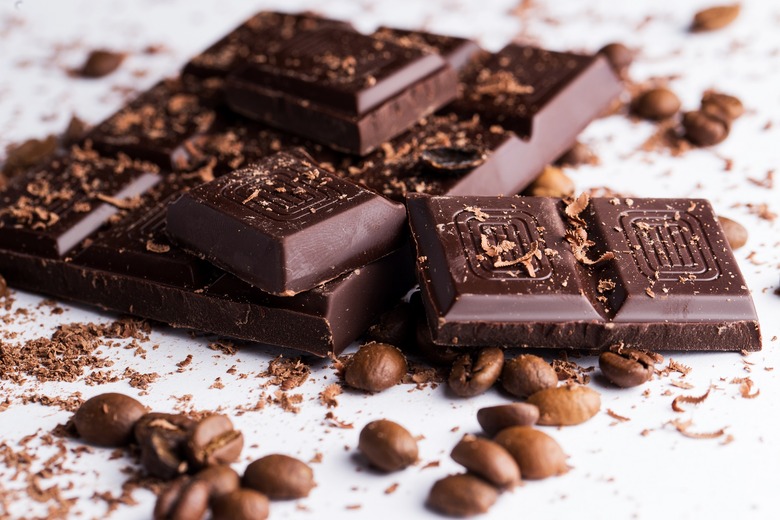Fancy Chocolate Is Way Healthier Than The Cheap Stuff
Put down the Hershey's. Once you read this, you might not ever want to waste a dollar on one of those flimsy bars again.
We understand that those artisan truffle chocolates and lavender-infused confections are a decadent and costly investment. We know you read online that dark chocolate had antioxidant-boosting power. And we bet you figured Nestle's cheap dark chocolate morsels were enough to fit the bill.
They do the trick for your chocolate craving, that's for sure. But if that's all you're judging your chocolate choices on, you're turning a blind eye to the health excuse behind eating the bars in the first place. We've got some disruptive news for you, and a new reason to splurge on some seriously rich chocolate bars.
Fancier chocolate is way — and I mean way — healthier than the cheap stuff.
The contentious debate rages on about whether or not chocolate is ever healthy. And despite the claims to cancer-preventing power and memory-boosting capacity, investigators of the pros and cons of dark chocolate fail to differentiate the type of dark chocolate you're buying.
The reason that fancier chocolate is healthier is simple. It all comes down to the ingredients. Ingredients of dark chocolate are immensely variable, stretching from bars made almost entirely of refined, white sugars to more sophisticated versions made primarily of the good stuff. Like, you know, chocolate. Cocoa. The beans themselves, ground and forged into delectable, much-better-tasting bars.
Dark chocolate does contain antioxidants that protect against disease-causing free radicals. However, if you're eating a few squares of a Hershey's bar and expecting to reap the benefits, you're making a crucial error. Think about it: How much actual dark chocolate are you getting? Not much. You're getting a sugar overload, an energy spike, a subsequent insulin crash, and (in less than a few short hours) an overpowering craving for more.
Allow me to concretize this for you with an example. These are the ingredients of two different brands of their most simple, dark chocolate.
Hershey's Special Dark: Sugar, chocolate, cocoa butter, cocoa pressed with alkali, milk fat, lactose, soy lechitin, PGPR, emulsifier, vanillin, artificial flavor, and milk
Some things that stand out:
— Artificial flavor? Shouldn't the flavor of chocolate be enough?
— The first ingredient is sugar.
— The cocoa is overly processed.
— There are three different kinds of milk products.
— There are unnatural chemicals involved.
Now let's look at a more expensive, cultivated brand of chocolate.
Theo's 85% Dark Chocolate: Cocoa beans, cane sugar, cocoa butter, ground vanilla bean
C'est tout! And the flavor results speak for themselves. But, in addition to the pure simplicity of the bar, the ingredients are fair trade and organic.
The fundamental differences between these two chocolates spread them miles apart, and the difference in effect on your body is far-reaching, as well.
The sugar content is the main differentiating factor. Chocolate made mostly of sugar isn't going to feel or taste as satisfying to your palate as a bar made with a richer cocoa concentration. This means that bars made of more sugar are likely to cause cravings later on, resulting in you overeating chocolate and spending a great deal more on the cheaper brands — at the cost not just to your wallet but also to your health.
In addition, one of the ingredients in cheaper chocolates is soy lechitin, an emulsifier. (This is true not just for Hershey's brand, but many lower-end offerings from Nestlé, Cadbury, Lindt, and others, as well — always check the ingredients!) It's used to keep the incongruous ingredients in chocolate blended (emulsified) for longer, so that the bar can last ages before going bad.
The chemical has been linked to some unfortunate side effects such as bloating, diarrhea, skin rashes, nausea, and stomach pain. One study even linked the compound to sensorimotor deficiencies in the animals tested.
Some brands, such as Antidote Chocolate, Taza Chocolate, and Dandelion Chocolate, have taken the ingredient list one step further and used cacao instead of cocoa or chocolate in their manufacture. Cacao powder contains over 300 phytochemicals and nearly four times the antioxidants of regular dark chocolate.
But dark chocolate is pretty great for you, too — especially in terms of your mental health. Did you know that dark chocolate actually produces the de-stressing hormone serotonin? Science is on our side, it seems.
However you choose to indulge, we recommend you stick to the basics. Check the nutrition label. The calories, fat content, and carbs in your chocolate bar don't much matter — they're all likely to be high, since chocolate is a treat and is commonly eaten in small servings. However, your ingredients make a difference in both the taste of your bar and the likelihood you'll raid your chocolate cabinet again five minutes later.
For more things you didn't know about your favorite sweet snack, click here.
